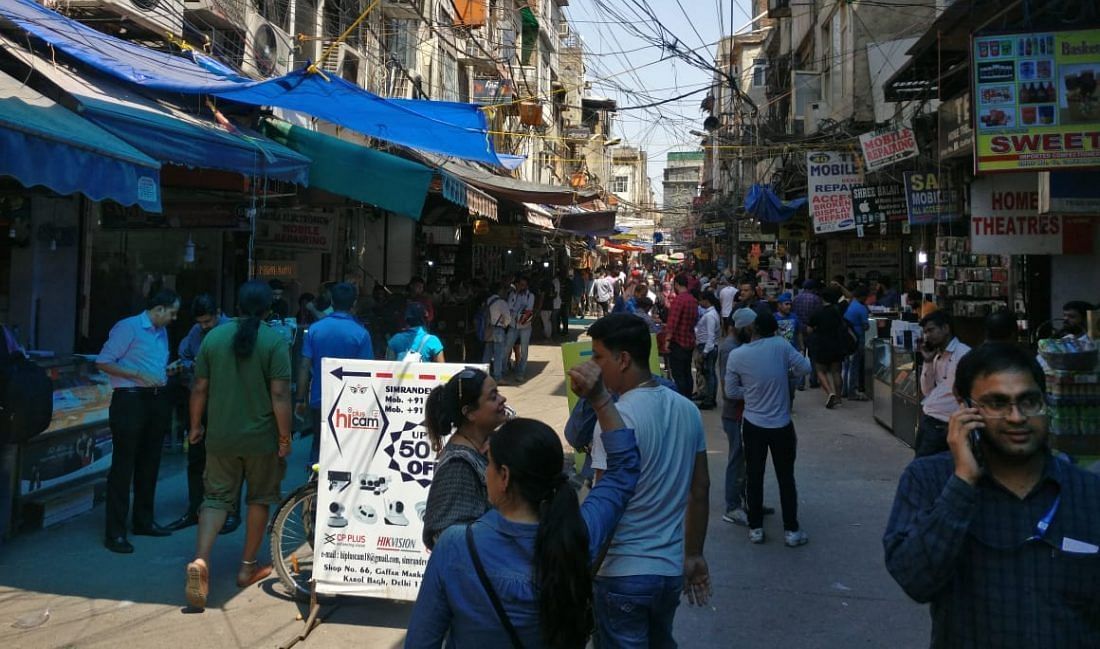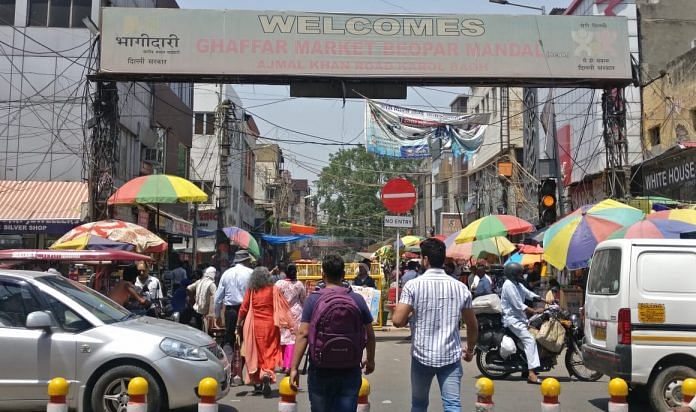New Delhi: There is little doubt that Khan Market is more than just a shopping complex — according to many like Prime Minister Narendra Modi and BJP national general secretary Ram Madhav, it is symbolic of an elitist worldview that needs to die.
But in the din surrounding Khan Market, what is often ignored is its ‘brother’, Ghaffar Market — a chaotic carnival of electronics, cosmetics, mobile phones and Chinese garments squeezed into the bylanes of Karol Bagh. ‘Brother’ not in the sense of any visible similarity, but because they’re named after freedom fighter brothers Khan Abdul Jabbar Khan and Khan Abdul Ghaffar Khan.
But the markets aren’t really alike by any stretch of imagination. In fact, except for the freedom fighter brothers they are named after, the two markets are as far apart as possible in social and political significance.
Born in 1890 in Utmanzai in the Peshawar Valley of British India, Khan Abdul Ghaffar Khan was a Pakhtun or Pathan from what becamethe North West Frontier Province of Pakistan, and is now called Khyber Pakhtunkhwa.
Despite the harsh cultural doctrine of revenge practiced by the Pakhtuns, Ghaffar Khan, also known as Bacha Khan or Badshah Khan, embraced and propagated the Gandhian philosophy of non-violence, spending the majority of his life attempting to lay the foundation for peace and communal amity in India and Pakistan.
After spending a large part of his youth building schools as a way to emancipate young minds from British dominance, Khan mobilised the Khudai Khidmatgar, or ‘Servants of God’ in the late 1920s. The movement placed a promise of non-violence within the religious paradigm of Islam — for Ghaffar Khan, they were one and the same.
“There is nothing surprising in a Musalman or a Pathan like me subscribing to non-violence,” he said. “It is not a new creed. It was followed fourteen hundred years ago by the Prophet, all the time he was in Mecca [before he migrated to Medina]… But we had so far forgotten it that when Mahatma Gandhi placed it before us we thought he was sponsoring a new creed or a novel weapon.”

To become ‘servants of God’, members had to pledge that they would “never use violence”, or take revenge, and “shall forgive anyone who indulges in oppression and excesses against me”.
Thus in Ghaffar Khan, whom Mahatma Gandhi met for the first time in 1928, the future father of the Indian nation saw a kindred spirit.
The Khudai Khidmatgar, whose numbers swelled to over 100,000 after the bloody massacre of 1930 in Peshawar’s Kissa Khwani (storytellers) Bazaar, remained an immovable ally of the Indian National Congress, and “each wave of arrests confirmed Ghaffar Khan’s status as the liberating champion of his people, who now called him Badshah Khan, or the Khan of Khans,” Karl E. Meyer wrote for The New York Times.
The Congress once reportedly offered Ghaffar Khan the post of party president, which he turned down, saying: “I am a simple soldier and a Khudai Khidmatgar, and I only want to serve.”
Meanwhile, Ghaffar Khan’s older brother Dr Khan Abdul Jabbar Khan managed the political wing of the Khudai Khidmatgar movement, representing the NWFP in the Central Legislative Assembly in 1935. In the 1937 provincial elections, Jabbar Khan also led The Frontier National Congress, an affiliate of the INC, to victory in the Muslim-dominated NWFP, serving as chief minister until his government was dismissed in 1947 by Muhammad Ali Jinnah in the newly-created Pakistan.
Also read: Sushi stop for Gandhis, jewel jaunt for Smriti Irani: Khan Market truly a Lutyens’ darling
A lifelong struggle
The creation of Pakistan broke the brothers internally, and snapped their political ties to the Congress. From the beginning, Jabbar and Ghaffar Khan opposed Partition, backing a united, secular India. In 1947, when Gandhi and the INC finally acceded to Partition during the last stages of negotiation, Ghaffar Khan felt betrayed.
He felt that Congress’ decision was born from a motivation towards political power, and its choice to not consult with him and the people of the NWFP meant the Congress had thrown the Pakhtuns “to the wolves”.
Dismayed by the inevitability of Partition, Ghaffar Khan put forth the Bannu Resolution — a formal statement that demanded the creation of an independent state for the Pakhtuns called ‘Pashtunistan’. The British refused to comply, prompting the brothers to boycott the referendum on joining India or Pakistan.
However, Ghaffar ensured that the NWFP would not be witness to the bloodshed of communal violence gripping other parts of northern India. In his book, Ghaffar Khan, Nonviolent Badshah of the Pakhtuns, Rajmohan Gandhi quotes Pakistani academician Sayed Waqar Ali Shah as saying: “Despite their desertion by the [Congress], the Khudai Khidmatgar still held strength in the province and…protected the lives and property of the non-Muslims in the NWFP.”
Also read: Khan Market is a fire-trap, but it’s a burning issue no one is talking about
The province was part of Pakistan’s territory, and Ghaffar was seen as a traitor and a threat. Now derided as a “lackey of the Hindu Raj”, Ghaffar Khan was imprisoned and charged with sedition by Islamabad’s new masters, according to The New York Times article.
In their fight for a free, united India, the Khidmatgars endured prison and torture, with Ghaffar Khan himself being incarcerated multiple times during the course of peaceful protests. According to a Scroll.in article, the time Khan spent in jail totalled a staggering 27 years — granting him the ‘Amnesty International Prisoner of the Year’ title in 1962.
Ghaffar Khan was the first foreign citizen to receive the Bharat Ratna — India’s highest civilian honour — in 1987.




Please if possible the name of the market maybe revise as bacha Khan market, because his opponents in Pakistan and the British rulers normally called him Ghafar Khan